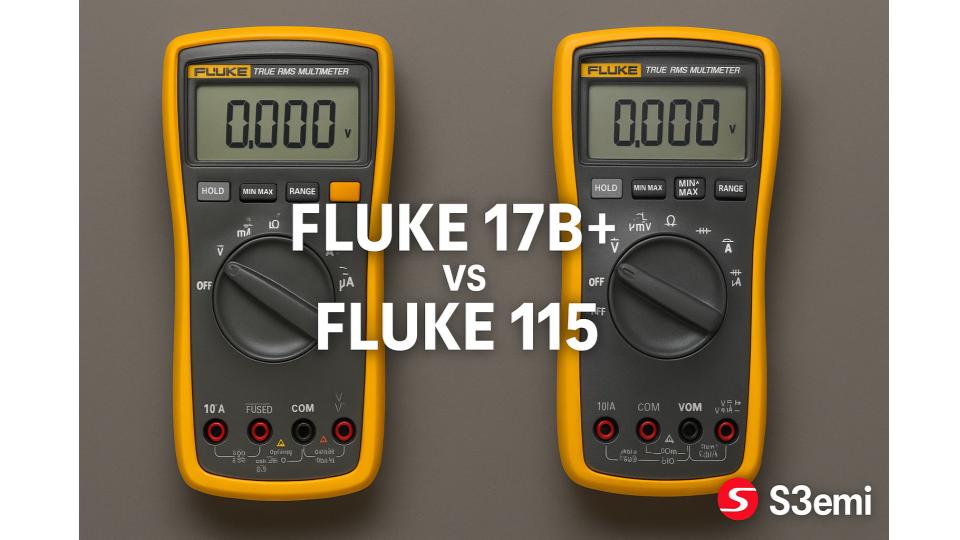Fluke’s multimeter lineup includes both compact models for general use and professional-grade meters for electricians. The Fluke 17B+ and Fluke 115 are two models often compared because they share similar size and features, but they are targeted at different users.
🏷️ Fluke Multimeter Deals ⭐⭐⭐⭐
Let’s break down the key differences.
📋 Quick Overview
- Fluke 17B+: Designed for technicians and engineers, offering True-RMS, temperature measurement, and a wide voltage range. Popular in Asia as a reliable mid-tier multimeter.
- Fluke 115: A professional multimeter for electricians, with True-RMS, LoZ mode, and compact design, ideal for field service and troubleshooting.
📊 Fluke 17B+ vs Fluke 115 Comparison Table
| Feature | Fluke 17B+ | Fluke 115 |
|---|---|---|
| Display | 6000-count LCD with backlight | 6000-count LCD with backlight |
| True-RMS | Yes | Yes |
| AC/DC Voltage | Up to 1000V | Up to 600V |
| Current Measurement | Up to 10A | Up to 10A |
| Resistance | Up to 40 MΩ | Up to 40 MΩ |
| Capacitance | Up to 10,000 µF | Up to 9,999 µF |
| Frequency | Yes | Yes |
| 💳 Pricing | 💲Check Price | 💲 Check Price |
| Temperature Measurement | Yes (with probe) | No |
| Continuity & Diode Test | Yes | Yes |
| Special Features | Min/Max recording, Temp probe | LoZ (Low Impedance), Fast AutoVolt |
| Battery Type | 2 × AA | 9V battery |
| Size & Weight | ~455 g | ~550 g |
| CAT Rating | CAT III 600V | CAT III 600V, CAT IV 600V |
| Target User | Technicians, engineers, hobbyists | Electricians, field service professionals |
✅ Pros & Cons of Fluke 17B+
Pros
- True-RMS for accurate AC readings
- Measures up to 1000V
- Temperature measurement included
- Wider capacitance range (up to 10,000 µF)
- Affordable compared to the 115
Cons
- No LoZ (can pick up ghost voltages)
- No non-contact voltage detection
- Not rated CAT IV like the 115
✅ Pros & Cons of Fluke 115
Pros
- True-RMS accuracy
- LoZ (Low Impedance) prevents ghost voltage errors
- Compact and ergonomic design
- CAT IV safety rating (more robust protection)
- Faster auto-ranging for field use
Cons
- Limited to 600V (vs 1000V for 17B+)
- No temperature measurement
- Slightly more expensive than the 17B+
🛠️ Which One Should You Choose?
- Choose the Fluke 17B+ if you’re an engineer, technician, or electronics enthusiast who needs higher voltage measurement, temperature testing, and advanced diagnostics.
- Choose the Fluke 115 if you’re an electrician or field professional who values LoZ safety features and CAT IV protection in commercial or residential wiring environments.
In short:
- 17B+ = Broader measurement capabilities
- 115 = Safer and faster for electricians




